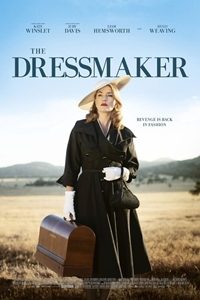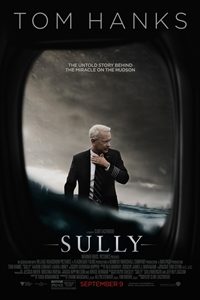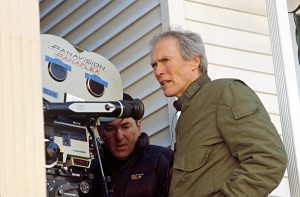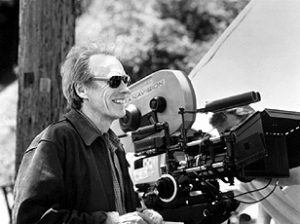‘American Pastoral’ breaks from all-American movie traditions
Director: Ewan McGregor
Written by: John Romano, based upon the novel by Philip Roth
Starring: Ewan McGregor, Jennifer Connelly, Dakota Fanning, Peter Riegert, David Strathairn, and Rupert Evans
“American Pastoral” – Newark Maid Gloves, a thriving manufacturer owned by the Levov family, is located in an industrial neighborhood of the New Jersey city with the same name. Life and business have operated swimmingly for decades, but riots during the late 1960s created a confrontational atmosphere for the factory. Generally speaking, protestors concentrated their efforts in large U.S. cities, but one incident - far from the factory - in the small town of Old Rimrock, NJ rocked the unsuspecting farming community in Ewan McGregor’s feature film directorial debut, “American Pastoral”.
McGregor plays Seymour ‘Swede’ Levov, and his character – for years - enjoyed a wonderful existence with his beautiful wife, Dawn (Jennifer Connelly), and their daughter, Merry (Dakota Fanning). They created an appealing, Rockwellesque life in Old Rimrock for themselves to raise Merry, while Swede commuted to Newark to run the family business with his dad (Peter Riegert), until the aforementioned incident changed their lives.
Although this particular event is the story’s fulcrum, McGregor and screenwriter John Romano broadly explore the fragile nature of family through an intimate study of the Levovs. First, the picture offers several carefully crafted scenes to establish Swede and Dawn’s virtue. The couple may carry surficial, all-American good looks, but their internal intentions are just as honest and true. For example, while Merry (at an elementary school age) struggles with a stutter and has problems making friends, Swede and Dawn show her much love and support and wish the very best for her.
They frequently discuss and act upon various ways to lift their daughter up at their homestead, complete with docile cows, large swathes of lush green grass and outdoor barbeques. Many of these scenes - with Ocean James playing an eight-year-old Merry - tug on our heartstrings, as we want to step into the screen and provide an encouraging word as well. Despite Swede and Dawn’s efforts to raise a warm human being, their seemingly never-ending attempts may or may not reach this separate soul.
When the soul in question allegedly brings a crisis to their family, their solid foundation begins to crack rather than hold.
In one key way, “American Pastoral” differs from other family dramas. When internal family dynamics explode in films, children usually take the protagonist roles, and out of touch parents play the hurdles and roadblocks to the kids’ salvation. Here, McGregor’s movie presents Swede and Dawn in a sympathetic light. They are the ones who are wronged. They are the victims. They are the ones who try to pick up the pieces and assemble a jumbled puzzle that carries no easy paths to solve. The role reversal does not celebrate youthful exuberance and idealism. Instead, it values stability and responsibility, and it offers the viewer a different perspective not too often seen in cinema.
McGregor and Connelly are utterly believable as a wounded couple searching for answers, and Connelly is especially effective and perfectly cast. As an aging beauty queen staring into a limited tomorrow, she gives one of the strongest supporting performances of the year and turns frighteningly icy during one brutally frank exchange. Not to be forgotten, McGregor competently carries the dual mantles of a concerned dad and director alike.
Keenly aware of his first effort from behind the camera, I noticed beautifully-filmed touchesthroughout the movie, and interestingly, many occurred during important walks by leads. Some notable examples are: Swede and Dawn’s determined stroll to the Newark Maid Gloves factory on a bright sunny day, a dark and cautious approach in one of the most deplorable sections in Newark and an affecting march during the film’s third act.
“American Pastoral” is not a feel-good film. The picture takes a loving family and applies damage to it. At times, the theatrical experience felt like I placed the underside of my forearm - facing upward - on my armrest, as the film burned it with an open cigarette. Emotions do run high, and "American Pastoral" demonstrates the unrequited parental love for a child more than any other of film - that I have seen - in years.
That specific love brightly burns, even when it hurts.
(3.5/4 stars)
Jeff – a member of the Phoenix Critics Circle – has penned film reviews since 2008 and graduated from ASU’s Walter Cronkite School of Journalism. Follow Jeff and the Phoenix Film Festival on Twitter @MitchFilmCritic and @PhoenixFilmFest, respectively.












 The Magnificent Seven
The Magnificent Seven
 ‘The Dressmaker’ needs some alterations
‘The Dressmaker’ needs some alterations
 ‘Storks’ delivers a fun animated experience
‘Storks’ delivers a fun animated experience
 Oliver Stone’s ‘Snowden’ is a valuable ‘Citizenfour’ companion piece
Oliver Stone’s ‘Snowden’ is a valuable ‘Citizenfour’ companion piece
 Blair Witch
Blair Witch
 Hollywood legend Clint Eastwood’s 35th directorial effort, “Sully” (3/4 stars), arrives in theatres on Friday, Sept. 9 with Tom Hanks in the title role. The film chronicles U.S. Airways pilot Chesley ‘Sully’ Sullenberger’s heroic landing on the Hudson River in January 2009. With another solid Eastwood film in theatres, this seems like a perfect time reflect upon his work. Although I would love to compile a Top 20, 17 or 15 list, my pragmatic nature and movie critic tendencies “require” me to somehow limit the number of movies to 10, so here are my Top 10 films directed by Clint Eastwood.
Hollywood legend Clint Eastwood’s 35th directorial effort, “Sully” (3/4 stars), arrives in theatres on Friday, Sept. 9 with Tom Hanks in the title role. The film chronicles U.S. Airways pilot Chesley ‘Sully’ Sullenberger’s heroic landing on the Hudson River in January 2009. With another solid Eastwood film in theatres, this seems like a perfect time reflect upon his work. Although I would love to compile a Top 20, 17 or 15 list, my pragmatic nature and movie critic tendencies “require” me to somehow limit the number of movies to 10, so here are my Top 10 films directed by Clint Eastwood. some Union fighters burn his house and kill his wife and son. With nothing to live for, he joins a group of Confederates, and soon after, he finds himself on his own and an outlaw. In a film that truly showcases everything about the American Western, Wales covers a winding story from Missouri to Texas and partners with – at various times – a teenager, two Native Americans and a family from Kansas. Eastwood mixes good fun with plenty of gunfights, as Wales offers a barrel full of memorable lines, countless visuals of his chewing tobacco spit, dead bodies in his wake, and - possibly - a reason to live.
some Union fighters burn his house and kill his wife and son. With nothing to live for, he joins a group of Confederates, and soon after, he finds himself on his own and an outlaw. In a film that truly showcases everything about the American Western, Wales covers a winding story from Missouri to Texas and partners with – at various times – a teenager, two Native Americans and a family from Kansas. Eastwood mixes good fun with plenty of gunfights, as Wales offers a barrel full of memorable lines, countless visuals of his chewing tobacco spit, dead bodies in his wake, and - possibly - a reason to live. convict from a Huntsville, Texas prison. On the morning after Halloween in 1963, Butch (Costner) and another con kidnap an 8-year-old boy named Phillip (T.J. Lowther). After Butch dumps his partner, the two drive across the state with Texas Ranger Red Garnett (Eastwood) on their tail. The movie volleys between Red and Butch, and it soon concocts a semi-case of Stockholm syndrome for Phillip and the audience. Butch treats Phillip with esteem and kindness, so Costner does not wind up playing a complete bad guy, but Red is an empathetic figure as well. With an occasional protagonist and a fulltime protagonist on opposite sides of the law, “A Perfect World” reminds us that we do not live in one.
convict from a Huntsville, Texas prison. On the morning after Halloween in 1963, Butch (Costner) and another con kidnap an 8-year-old boy named Phillip (T.J. Lowther). After Butch dumps his partner, the two drive across the state with Texas Ranger Red Garnett (Eastwood) on their tail. The movie volleys between Red and Butch, and it soon concocts a semi-case of Stockholm syndrome for Phillip and the audience. Butch treats Phillip with esteem and kindness, so Costner does not wind up playing a complete bad guy, but Red is an empathetic figure as well. With an occasional protagonist and a fulltime protagonist on opposite sides of the law, “A Perfect World” reminds us that we do not live in one. – Sean Penn and Tim Robbins won Oscars for Best Actor and Best Supporting Actor, respectively, in Eastwood’s dark crime tale filled with massive Shakespearean themes, when three childhood friends’ (Penn, Robbins and Kevin Bacon) lives intersect as adults under brutal circumstances. In chilly Boston, a coed is found dead, and the three previously-mentioned men approach the incident from very different perspectives, while the tightly-wound and complicated murder investigation pushes forward. An all-star cast – including, Laurence Fishburne, Marcia Gay Harden and Laura Linney – complete a mesmerizing experience which brings constant thoughts friendships, loyalties and how the sins of the past impact the present. The film’s most memorable line – “The last time I saw Dave” - will haunt you for years.
– Sean Penn and Tim Robbins won Oscars for Best Actor and Best Supporting Actor, respectively, in Eastwood’s dark crime tale filled with massive Shakespearean themes, when three childhood friends’ (Penn, Robbins and Kevin Bacon) lives intersect as adults under brutal circumstances. In chilly Boston, a coed is found dead, and the three previously-mentioned men approach the incident from very different perspectives, while the tightly-wound and complicated murder investigation pushes forward. An all-star cast – including, Laurence Fishburne, Marcia Gay Harden and Laura Linney – complete a mesmerizing experience which brings constant thoughts friendships, loyalties and how the sins of the past impact the present. The film’s most memorable line – “The last time I saw Dave” - will haunt you for years. Best Director, Best Supporting Actor for Gene Hackman, and Best Film Editing and proved – along with “Dances with Wolves” (1990) – that the genre can win the Academy’s top prize. Eastwood delivers a prized role as well as William Munny, an aging cowboy who takes one last bounty hunter job after years of living a clean life. Munny frequently speaks of his violent past, but the audience presently sees a cordial and respectful man, so any previous sinister dealings seem either deeply buried or simply exaggerated. In the movie’s final act, however, Sheriff Little Bill Daggett (Hackman) tests Munny’s patience with potentially explosive consequences. Most everything in the town of Big Whiskey, Wyo. (actually filmed in Alberta, Canada) feels bleak and cold, and the tones match Munny’s job of attempting to kill two cowboys for a group of prostitutes. In this world, no one is completely innocent, and Munny mentions to one of his partners in passing, “We all have it coming, Kid.” Not only does Little Bill have it coming, but so does the Kid, the targeted cowboys, Munny’s other partner named Ned (Morgan Freeman), and Munny himself. Munny’s past sins – unfortunately – are just skin-deep, and even though his wife forgave his past misdeeds, to him, they remain unforgiven.
Best Director, Best Supporting Actor for Gene Hackman, and Best Film Editing and proved – along with “Dances with Wolves” (1990) – that the genre can win the Academy’s top prize. Eastwood delivers a prized role as well as William Munny, an aging cowboy who takes one last bounty hunter job after years of living a clean life. Munny frequently speaks of his violent past, but the audience presently sees a cordial and respectful man, so any previous sinister dealings seem either deeply buried or simply exaggerated. In the movie’s final act, however, Sheriff Little Bill Daggett (Hackman) tests Munny’s patience with potentially explosive consequences. Most everything in the town of Big Whiskey, Wyo. (actually filmed in Alberta, Canada) feels bleak and cold, and the tones match Munny’s job of attempting to kill two cowboys for a group of prostitutes. In this world, no one is completely innocent, and Munny mentions to one of his partners in passing, “We all have it coming, Kid.” Not only does Little Bill have it coming, but so does the Kid, the targeted cowboys, Munny’s other partner named Ned (Morgan Freeman), and Munny himself. Munny’s past sins – unfortunately – are just skin-deep, and even though his wife forgave his past misdeeds, to him, they remain unforgiven. This Crusoe story, ‘The Wild Life’, is visually pleasant but feels lost
This Crusoe story, ‘The Wild Life’, is visually pleasant but feels lost








